
- NEW: The death toll across the country for Wednesday climbs to 197
- Turkey releases a Syrian civilian plane, but keeps some of the cargo
- Samar Yazbek's Syria memoir lauded with PEN Pinter award
- Rebels post video that appears to show regime forces surrendering
(CNN) -- Here are the top five things happening Syria on Wednesday that you need to know:
1. Syrian novelist Samar Yazbek, who risked her life to document her countrymen's suffering, has won the prestigious PEN Pinter International Writer of Courage Award. Her memoir "A Woman in the Crossfire: Diaries of the Syrian Revolution," chronicles the first months of the uprising against President Bashar al-Assad. Yazbek writes about standing at a rally and seeing a man next to her shot down by a sniper. She recalls trying to save a fleeing boy who was orphaned when his parents were taken by police because they were protesting.
Well-known in her country before the civil war, Yazbek is also an Alawite, the same sect as the Assad family. For taking a position against al-Assad, her family disowned her. She dedicated her book to "the martyrs of the Syrian revolution" and "those who move among the downpour of bullets and artillery fire, the tanks and the fighter jets, in order to carry on the revolution of the Syrian people toward establishing a free and democratic society."
Read excerpts of the book and a profile of Yazbek
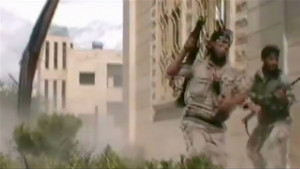 Syrian troops surrender in vital town
Syrian troops surrender in vital town 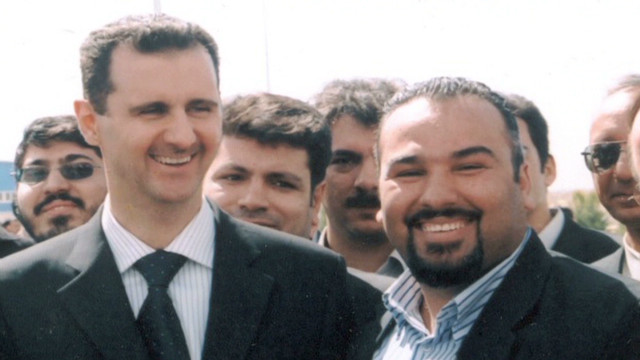
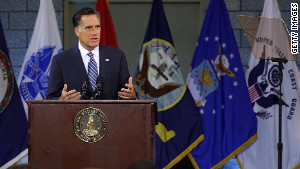 Romney supports arming Syrian rebels?
Romney supports arming Syrian rebels? 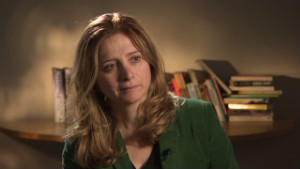 Syrian writer was beaten, humiliated
Syrian writer was beaten, humiliated 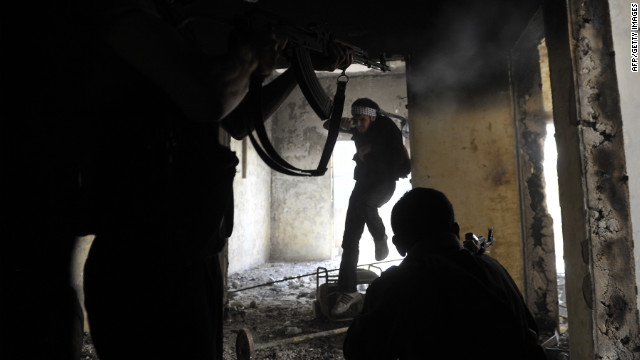 Syrian rebels take up positions inside a building during clashes with government forces in Aleppo on Saturday, October 6. Click through the gallery to view images of the fighting in October. See photographs of the fighting in September.
Syrian rebels take up positions inside a building during clashes with government forces in Aleppo on Saturday, October 6. Click through the gallery to view images of the fighting in October. See photographs of the fighting in September. 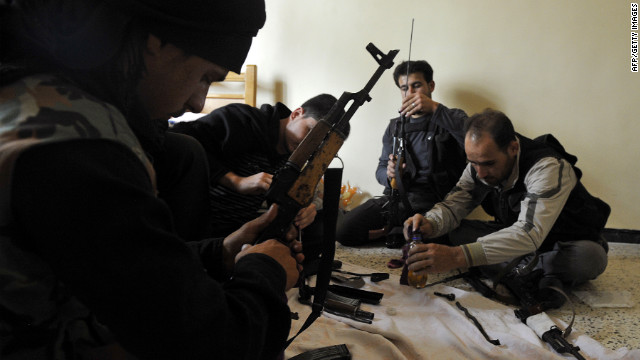 Syrian members of the Al-Saiqa rebel brigade clean weapons on Saturday before going to the front line in Aleppo.
Syrian members of the Al-Saiqa rebel brigade clean weapons on Saturday before going to the front line in Aleppo. 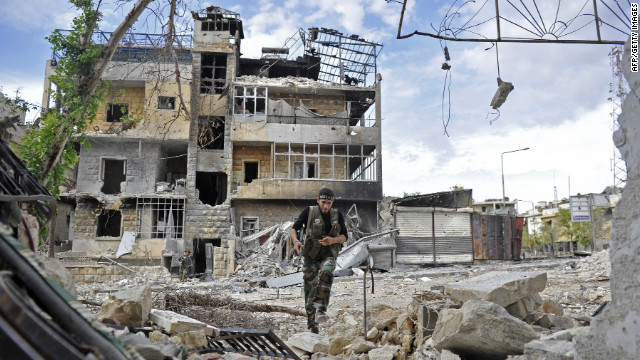 A Syrian rebel runs across a heavily damaged street to dodge sniper fire during clashes on Saturday.
A Syrian rebel runs across a heavily damaged street to dodge sniper fire during clashes on Saturday. 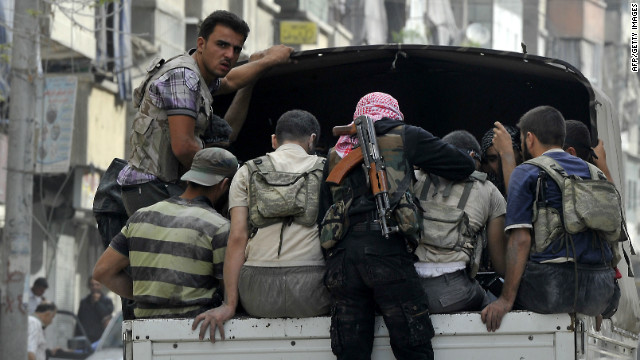 Syrian rebels patrol a neighborhood in Aleppo on Friday, October 5.
Syrian rebels patrol a neighborhood in Aleppo on Friday, October 5. 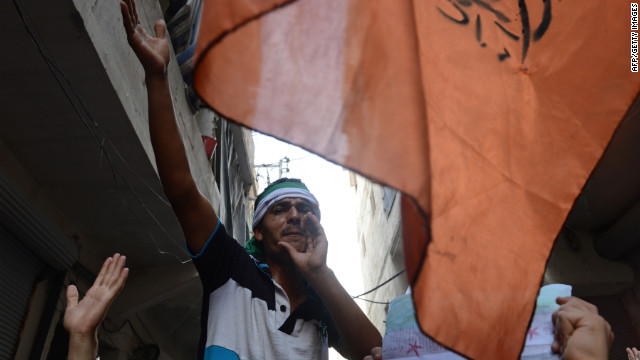 A Syrian demonstrator shouts during an anti-regime protest in Aleppo on Friday. Tensions rippled across Turkey a day after Syrian shells struck a Turkish border town and killed five people.
A Syrian demonstrator shouts during an anti-regime protest in Aleppo on Friday. Tensions rippled across Turkey a day after Syrian shells struck a Turkish border town and killed five people. 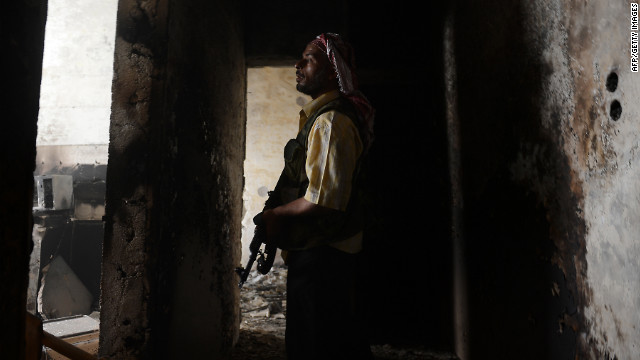 A Syrian rebel takes position during clashes with government forces in Aleppo on Friday.
A Syrian rebel takes position during clashes with government forces in Aleppo on Friday. 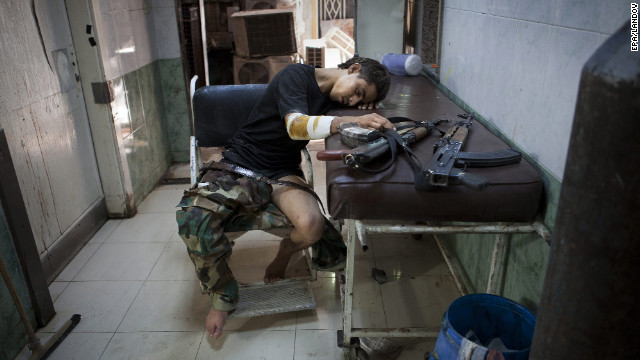 An injured Free Syrian Army fighter rests after receiving treatment at Dar al Shifa hospital in Aleppo on Thursday, October 4.
An injured Free Syrian Army fighter rests after receiving treatment at Dar al Shifa hospital in Aleppo on Thursday, October 4. 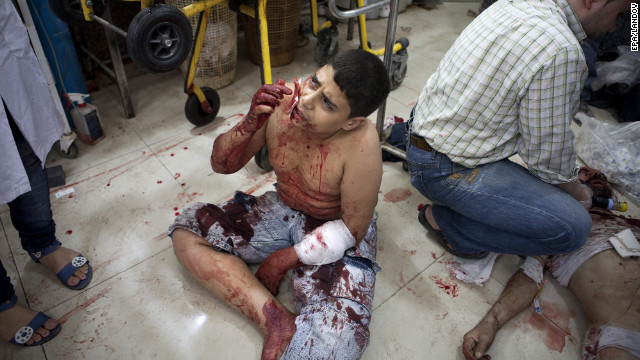 A child covers his wounds from a Syrian army sniper at Dar al Shifa hospital on Thursday.
A child covers his wounds from a Syrian army sniper at Dar al Shifa hospital on Thursday. 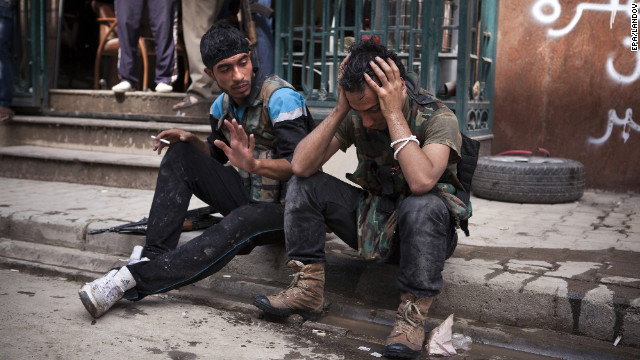 A Free Syrian Army figther cries after one of his friends was injured in fighting with government forces outside the Dar El Shifa hospital on Thursday.
A Free Syrian Army figther cries after one of his friends was injured in fighting with government forces outside the Dar El Shifa hospital on Thursday. 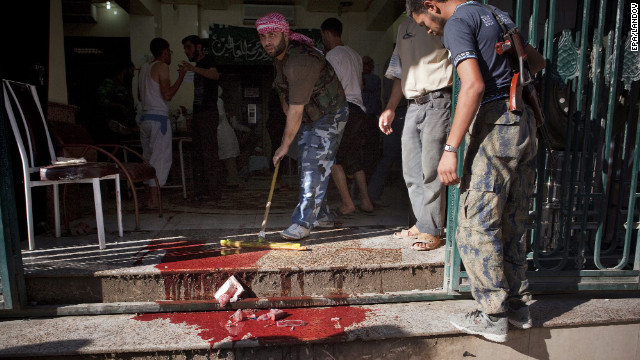 A Dar El Shifa worker cleans the floor outside the hospital in Aleppo on Thursday.
A Dar El Shifa worker cleans the floor outside the hospital in Aleppo on Thursday. 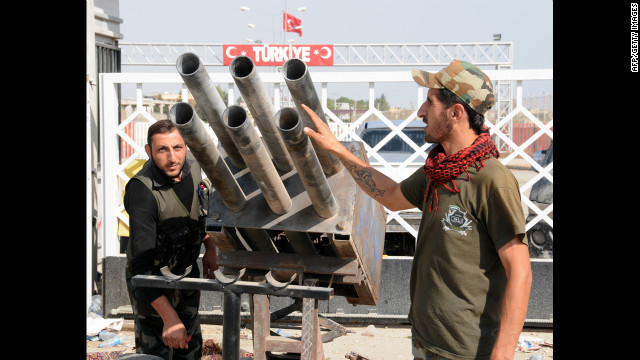 Syrian rebel fighters look at a multirocket launcher in Tal Abyadh, a Syrian town close to the Turkish border, on Thursday.
Syrian rebel fighters look at a multirocket launcher in Tal Abyadh, a Syrian town close to the Turkish border, on Thursday. 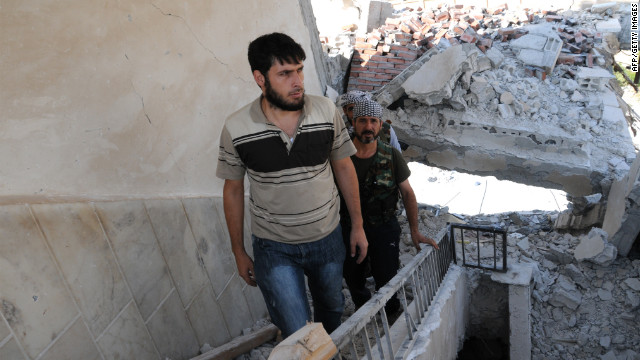 Rebels climb the stairs of a destroyed building Thursday in Tal Abyadh.
Rebels climb the stairs of a destroyed building Thursday in Tal Abyadh. 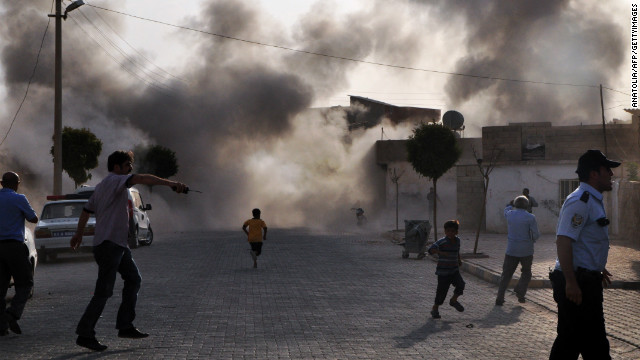 Smoke rises from the explosion area after several Syrian shells crashed inside the town of Akcakale in Turkey, killing at least five people on Wednesday, October 3. It wasn't the first deadly cross-border incident between the two neighbors during the 18-month-long uprising in Syria.
Smoke rises from the explosion area after several Syrian shells crashed inside the town of Akcakale in Turkey, killing at least five people on Wednesday, October 3. It wasn't the first deadly cross-border incident between the two neighbors during the 18-month-long uprising in Syria. 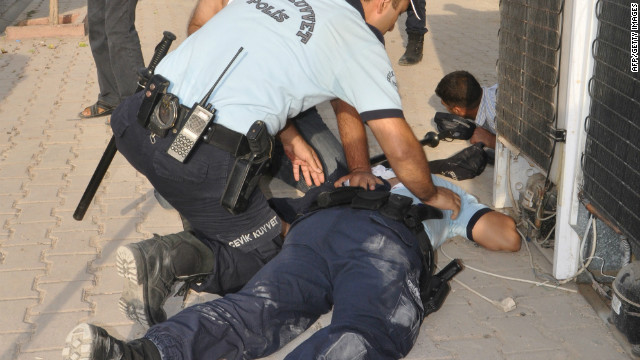 A police officer is injured in Wednesday's attack on Akcakale in Turkey's Sanliurfa province.
A police officer is injured in Wednesday's attack on Akcakale in Turkey's Sanliurfa province. 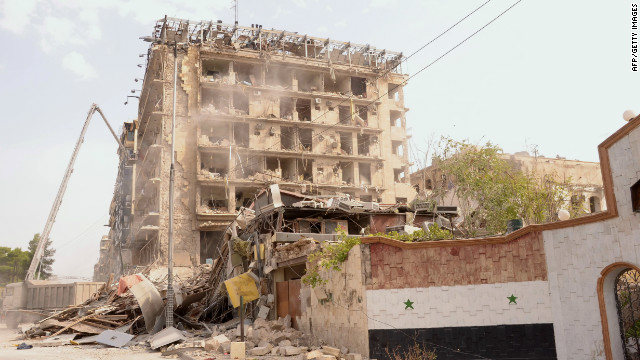 Three car bombs destroyed the area around a military officers' club and a hotel in Aleppo, Syria, on Wednesday. At least 40 people were killed and 90 wounded, most of them soldiers, a monitoring group said.
Three car bombs destroyed the area around a military officers' club and a hotel in Aleppo, Syria, on Wednesday. At least 40 people were killed and 90 wounded, most of them soldiers, a monitoring group said. 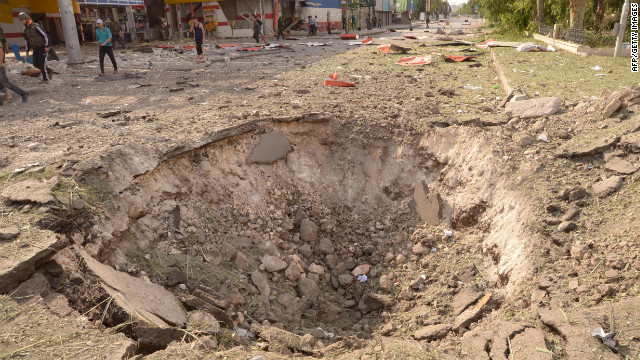 Car bomb explosions on Wednesday left a crater in the ground.
Car bomb explosions on Wednesday left a crater in the ground. 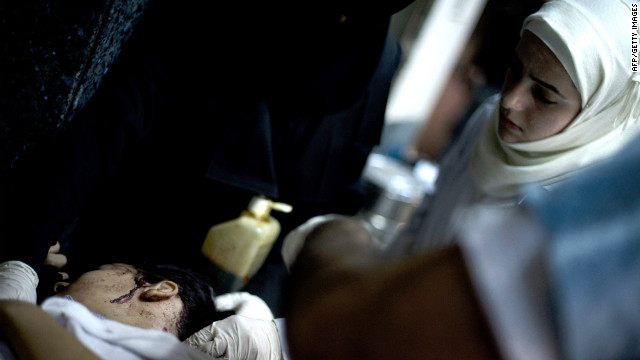 A nurse helps treat a 7-year-old girl who's neck was badly wounded by shrapnel at the Dar Al Shifaa hospital in Aleppo on Monday, October 1.
A nurse helps treat a 7-year-old girl who's neck was badly wounded by shrapnel at the Dar Al Shifaa hospital in Aleppo on Monday, October 1. 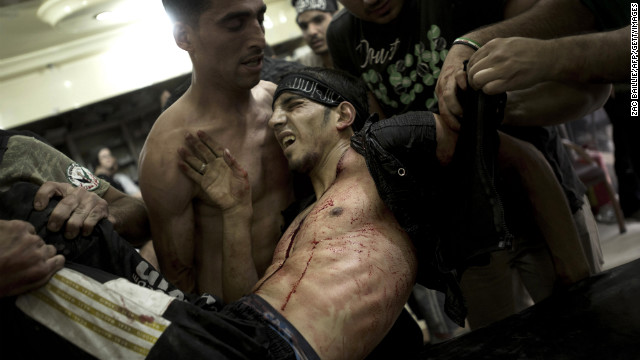 Friends lay a rebel fighter on a gurney after he was shot in the chest during heavy battles in the Midan neighborhood on Monday.
Friends lay a rebel fighter on a gurney after he was shot in the chest during heavy battles in the Midan neighborhood on Monday.  Photos: Showdown in Syria
Photos: Showdown in Syria 2. The war has dragged on for more than a year and a half. Each day, death tolls are high. Wednesday was no different. The Local Coordination Committees in Syria, those who speak for activists trying to oust al-Assad, said 197 people died Wednesday. The figure includes women and children. In Damascus, it said, 77 died; 25 in Idlib, 16 in Homs, 35 in Aleppo, 14 in Raqqa, 13 in Daraa. Six died in Hama, 10 in Deir Ezzor and one in Lattakia.
One rebel commander was killed as rebel groups clashed with government troops on the Damascus-Aleppo International Highway, the London-based Syrian Observatory for Human Rights said.
Regime shells began raining down on neighborhoods of Khalidiya, Jouret Shiyah and Homs old city.
Syrian State TV also reported Wednesday that a state TV cameraman, Mohammed Al-Ashram, was "killed by terrorist gunfire in Deir Ezzor." For some time, al-Assad has blamed terrorists for the violence in Syria. Activists say his forces are behind the brutality.
Also on Wednesday, Turkish media reported that a Syrian civilian plane was forced to land in Ankara. "We asked a plane to land," according to the office of Turkey's Foreign Minister.
Sealed packages were found during initial inspections of the plane, the report said.
The flight originated in Moscow and was made to land at Ankara's Esenboga airport, CNN learned.
The semi-official Anadolu News Agency was reporting that Turkey was releasing the Syrian plane, crew and passengers, but keeping some of the cargo as part of the investigation.
Initial reports indicate the cargo is "military grade communication devices," Turkey's state-run TRT outlet said.
Separately, there may be more fallout as details continue to come out about a huge explosion on Monday night at an Air Force Intelligence compound outside Damascus. Opposition representatives said Tuesday that "hundreds of regime forces" may have been killed in the attack, but concrete casualty figures were impossible to obtain. The AFI is considered the elite, primary branch of Syria's 17 intelligence services.
Read more about what two women experienced when the explosion happened
3. The New York Times reported Wednesday that the U.S. military has secretly sent a task force of more than 150 planners and other specialists to Jordan to help Jordanian troops deal with an estimated 180,000 Syrian refugees.
In May, CNN reported that the United States sent troops to Jordan for a training exercise called Eager Lion. CNN has continuously covered the work of the task force, a joint special operations group of about 150 that has been in and out of Jordan regularly. U.S. special forces have, since April, been working on a variety of potential scenarios in Jordan, CNN's Barbara Starr has reported. Those scenarios include border protection, moving into Syria to secure chemical weapons and debriefing defectors. The group is also offering advice on humanitarian relief and corridors.
On Wednesday, a senior official from the Jordanian Armed Forces denied media reports about the presence of U.S. forces in the country helping handle refugees. The official said that the Jordanians could handle "any kind of future threats."
4. The civil war has been covered in videos posted inside Syria. CNN, like other news organizations, is unable to verify the authenticity of the videos because foreign journalists have been largely prevented from entering the country to cover the violence.
Activists posted videos showing government soldiers apparently surrendering in the city of Maarat Nouman, which is south of Idlib. One of the rebel fighters screams "Don't shoot at anyone!" Another rebel shouts "God is great, this is the surrender of al-Assad's dogs!"
Another long video detailed a description of the end of two days of battle. It appears to show rebels taking over what they describe as the main security center that was used by government forces to detain and torture anti-regime activists. One of the rebels shouts "We announce a liberated city, God willing!"
More footage online shows rebels celebrating in Maarat Nouman. One of the rebels chants, "We are coming to get you, oh Bashar!"
5. Al-Assad has finally replaced Nawaf al-Fares, Syria's ambassador to Iraq, who defected on July 11. SANA, the state-run news agency, reported that the former ambassador was "relieved of his duties" after he "made press statements that contradict the duties of his position of defending the country's stances." Syria's new ambassador to Iraq, Sattam Jad'an al-Dandah, was sworn in during a ceremony Tuesday and al-Assad wished him well, SANA reported.
Meanwhile, United Nations Secretary-General Ban Ki-moon said that the situation in Syria has "dramatically worsened."
"It is causing serious risks to the stability of Syria's neighbors and the entire region," he said. "The escalation of the conflict, along the Syrian-Turkish border and the impact of the crisis on Lebanon are extremely dangerous. This is a regional calamity with global ramifications. I am deeply concerned by the continued flow of arms to both the Syrian government and opposition forces.
"I urge again those countries providing arms to stop doing so," he said. "Militarization only aggravates the situation."
The Syrian Ministry of Foreign and Emigrants Affairs responded by saying that Syria has tried twice before to issue cease-fires that did not work, spokesman Jihad Makdissi said in written release. The release accused Ban of presenting "only half of the truth."
CNN's Michael Martinez contributed to this report.




















